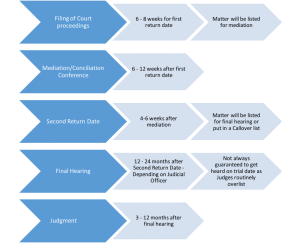 One of the most common questions of family law client’s embarking upon the process of division of assets of a relationship is “how long will this take”. Closely akin to “how much will this cost”, the answer remains, “how long is a piece of string?” This is because there are simply so many variables in a property settlement dispute, ranging from the other parties attitude to the separation and division of assets, the style of lawyer that they engage, when proceedings are commenced and which judicial officer the matter is listed before.
One of the most common questions of family law client’s embarking upon the process of division of assets of a relationship is “how long will this take”. Closely akin to “how much will this cost”, the answer remains, “how long is a piece of string?” This is because there are simply so many variables in a property settlement dispute, ranging from the other parties attitude to the separation and division of assets, the style of lawyer that they engage, when proceedings are commenced and which judicial officer the matter is listed before.
The stark reality for family law litigants is that delays are extreme and they are growing. This is due to a number of factors, including the sheer volume of applications being commenced in the Family Law Courts and lack of judicial resources nationally and particularly in South-East Queensland. As an example, the usual timeline for a property settlement dispute in the Federal Circuit Court would look like this:-

It is clear that the delays are significant and they have the effect of parties being unable to move on with their lives financially and emotionally whilst they are embroiled in the battle.
So what can be done differently?
Whilst not a new concept, in Family Law or elsewhere, Arbitration as a dispute resolution process in Family Law is gaining significant traction, particularly in South East Queensland. This is because the entire process of property settlement disputes can be resolved within 3 – 6 months and parties will have a binding award resolving their property matters.
Arbitration can be privately arranged between the parties or Ordered by the Court upon the Application of the parties. The Family Law Act recognizes this by defining two types of Arbitration:-
- Section 13E Arbitration – which is an arbitration carried out as a result of a Court Order made by consent in current proceedings; and
- Relevant Property or Financial Arbitration – which is in practical terms a private arbitration.
A Section 13E Arbitration can deal with applications regarding property adjustments, setting aside a property order, periodic and lump sum spousal maintenance.
A private arbitration can deal with all of the above matters as well as issues regarding Financial Agreements and Superannuation splitting arrangements.
The Arbitration process is a flexible process which can be molded to suit the needs of the parties and issues in question.
Simple property settlement matters with narrow issues could conduct an arbitration on the papers without any need for oral evidence or cross examination.
At the more complex end of the scale, matters can be conducted as if in a trial setting and adopt a traditional process of filing of affidavit material and cross examination.
After the appointment of an Arbitrator, the design of the Arbitration process occurs at a Preliminary Conference or Pre-Hearing Conference during which the lawyers, parties and Arbitrator have a round table discussion about the following issues:-
- Settlement of the terms of the Arbitration Agreement
- Identification of issues requiring determination
- Decision as to the application of the rules of evidence and the level of formality to the process
- Decision as to whether the matter is to proceed on the papers
- Discussions about the property pool, superannuation and valuation issues
- Disclosure extent and timing for delivery
- The evidence to be produced by each party
- Witnesses to be called and cross examined
- Duration of the hearing
- Timetable and venue for hearing and determination
- Responsibility for payments of costs
- Arrangements for a further pre-hearing if required.
The hearing occurs after all the pre-hearing conference steps have been taken and is undertaken in accordance with the process agreed to at the pre-hearing conference. Parties are entitled to represent themselves in Arbitration as with any litigation process.
After the hearing, the Arbitrator will provide the parties with an “award” and a set of written reasons for the determination, in the period specified in their appointment agreement. This is often within a week of the hearing.
The award is binding on the parties and can only be set aside on very limited grounds as established in the Family Law Act. Parties then have the option of registering the award with the Court to enable enforcement to occur if there are compliance issues.
So why choose Arbitration? Because of the savings it offers parties. Savings in terms of time from commencement to conclusion of their matter. Savings in terms of the costs associated with a protracted and extensive litigation process. Whilst there are still costs associated with Arbitration, these would, in most circumstances, pale when compared to the costs associated with lengthy litigation. But most importantly, the personal savings for parties in having their issues addressed and resolved in a private, personally designed process.
The Family Law team at Marino Law have undertaken specialised training in the arbitration process and are available to meet with you and discuss the benefits to you of resolving your matter through this process.

